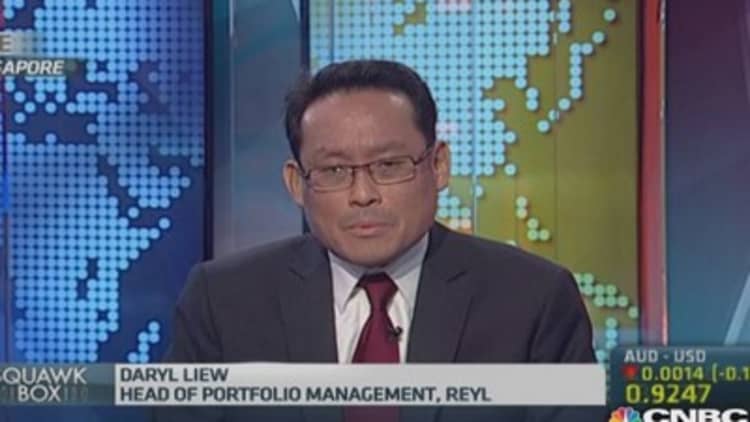Chinese stocks have stormed higher in recent months on the back of stronger economic data, easy monetary conditions and supportive policies from Beijing, intensifying the debate over whether the infamous market laggard can finally break out of its multi-year slump.
The has notched four straight weeks of gains, bagging an 8 percent rise in total. It's now up more than 12 percent from the lows in March and up nearly 5 percent since the start of the year. The benchmark index has finished in the red every year since 2010.
China bulls are holding steadfast to their calls for further gains for the year, with many citing the imminent launch of the Shanghai-Hong Kong Stock Connect, or "through train" scheme, in October.
Read MoreAsia stocks hit by Iraq worries but China data lifts Shanghai
The scheme, announced by Chinese premier Li Keqiang in April, will allow global investors, institutional and retail, to trade Shanghai 'A' shares via the Hong Kong stock exchange. At present, only institutional investors abroad with secured quota from the government can invest directly in China's domestic markets.
"China's mainland market is still looking attractive and the link-up should boost investments in the fourth quarter," said Dickie Wong, executive director at Kingston Securities, who expects the Shanghai Composite to rise another 10 to 15 percent before the end of the year.
"At present, China's A-shares, especially blue chip counters such as ICBC, CCB, Ping An and China Life are still are trading at a steep discount over H-shares so that should present good opportunities for investors," he said.

Ryan Huang, market strategist at IG, notes that Chinese stocks are still cheap compared to other major markets. The Shanghai Composite is trading at a forward P/E of about 9 times, much lower than forward P/E of S&P 500 at 16 times and the at 17 times.
"I see no signs that will hold back stock prices. If China's economic data continues to shine, the market will grind higher," he said.
China's economic data have been increasingly positive in recent months, buoyed by a drip-feed of stimulus from Beijing to support growth as the government engineers a restructuring of the economy away from investment towards a focus on domestic consumption. July's industrial output and retail sales data due this week will be watched for more signs of an economic recovery.
Read More'Perfect storm' to hit China economy in 2016
IG's Huang is particularly upbeat on technology stocks such as Tencent, Baidu and JD.com sector, which should benefit from a strengthening economy.
"They are trading at lower valuations compared to their U.S. counterparts, and have much more upside as they expand across the country and new markets," he said.
To be sure, not everyone is buying into the bullish A-share story. Jim Walker, founder and CEO of Asianomics, says he is still worried about China's growth outlook, warning of the risks of rising Chinese debt. China's debt-to-GDP ratio has hit 251 percent in July, from 147 percent at the end of 2008.
Read MoreOver 150 Chinese 'economic fugitives' at large in US
"I am not surprised that Chinese stocks are doing well, but that is because the government has been flushing the system with easy money," he says. Walker, a long-time bear on China, believes the current run-up in the market is not sustainable, and recommends investors take profit while they can.
"Sure, [China's] trade surplus was strong, but that was partly because of lower imports. If China's economy is really doing well, imports should be rising, not the other way around," he says. He is also suspicious about China's benign consumer inflation rate, which rose a modest 2.3 percent in July, unchanged from June, saying the number should tick higher if consumers spend more.
IG's Huang admits there are risks that could upset the bright outlook on Chinese stocks, especially a potential property bubble, which could destabilize the economy and send stocks reeling.
"We continue to watch the property sector for warning signs. There is a risk from the glut of unsold units as housing inventories build up, which could throw the industry into an extended slump if not managed properly," he said.


